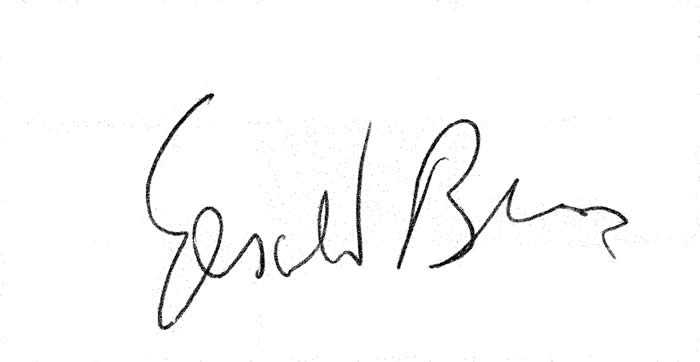
Heads bent or cocked over a text and brandy, the words looked at and altered or parenthesized in green
(to show they are potentially alterable), agreement is what’s lovely, this word won’t do, this section
by attention to psychology inside a dream, disastrous, or concentration on means of getting from here to there.
It’s not right to call brandy in the glass amber, a different color if someone else pays for it, Eve’s peach,
fuzzed pomme, the color of an Asian pear, or yellowed Granny, not red at all, as in black and white
brandy’s like white wine, not the incredible lucent green of absinthe in Degas or Manet, unless Armagnac,
the pastel far from clarity and odd darks trembling, page weighed by fingertip.
“Chased through Corbin by dogs and boys, he came to this country like a madman,” his shield
black with silver queen and man kneeling. They called his castle Joyous, surrounded by water, Elaine in.
Set narrative in Malory proceeds at the level of the word, deliberate as Proust, unexpected.
Even repeats repeat, in prose like a ballad closure. So we conclude the symbolist thing is unpresent narrative,
herring clouds you see the moon through, as if Doré’s black ink could really render something silver
as Gary says: “One is articulate in Purgatory, images, horror, anecdote relied on in Inferno.”
Light striking an engraved wall is dulled, Pandemonial talk by it freckled etching, terracotta
Laocoön mouths as in House of Wax, always possible to turn down more at the corners.
Blue vases on a black mantel like the black clock Cézanne painted, funereal, bourgeois,
speak the word “silent,” as Cézanne’s tipped ones speak the word “vertical.” We’ve given up
point-for-point representation that the mimed thing, Symposium hilarity, by atmosphere
contains Love like a purloined letter.
The glazed bowl shows a full moon, palpably spherical in an ink-colored sky. Below, prescinding from
the bowl’s curve a house (beside a lake), inside a room, one wall carved pillars and dragon panels
that if you enter vanish, that side opened out to be a series of narrow pools enclosed in rock,
in descending series like a rock garden made of water. A night ago one of the top ones had a fountain,
just a few jets, cold, the lower pools warmer to the touch, waded in, invitation to remove clothing
and sink or slide into the deeper ones like a medieval bed, the lake outside not even notional
yet apposed, water here, water there, if you look, visible through tall windows, the room daylit
though outside it’s moonlight. But the lake doesn’t reflect the moon, because that was last night’s
and not a dream though how it rode, almost compassionate, it could have been.
Mary’d been dead five years when “The Vampire of Kring” was printed, not much in it about how you can’t cross streets
or thresholds without invitation, moon on our black leather wings, little finchlings in the pine outside my window
today with flush of pink, ruby to salmon, on heads and thoraxes, invitable to the gray shingle but they’d
none of it, stayed in the fluffy green pine or phone wire, just luck to see the rose as rose, accident of light.
It makes no sense at the level of perception that day and night alternate, each an element. Dawn’s announced
by this ornithic jangling. “It’s absurd, absurd Darwinian self-pity!” says Snodgrass, and rhymes it with committee.
The moon imagined is the moon perceived. An open can of paint, off-white, can be the moon.
A young man, lightly clad, falls asleep in Trinidad, awakened simply for the sequentiality by birds
with giant eyes and fringed mouths who rain down seeds on him, diablotins implicit in the paint can’s
oval, double-centered as in Kepler, that look as if their beaks are full of insect antennae.
Chaucer’s dream invaded when his eye lit on a pail half-full of milk.
Reverie is not and never has been poetry, but poems spring from it. We’re admonished
by Moneta for being dreamers only, frozen on mid-step in her imaginary palace.
Words gritty as moonbeams thwart until applied torsion
makes hooks or stops to push or pull against, out of air
as things we care about are nexi of what seem
quite other elements, yet these are their coagulants.
You find in Keats Adonis, just about to awake
invaded by sweet odors from above he imagines
might be visible, like wine poured into water.
Copyright Gerald Burns 1995-1997